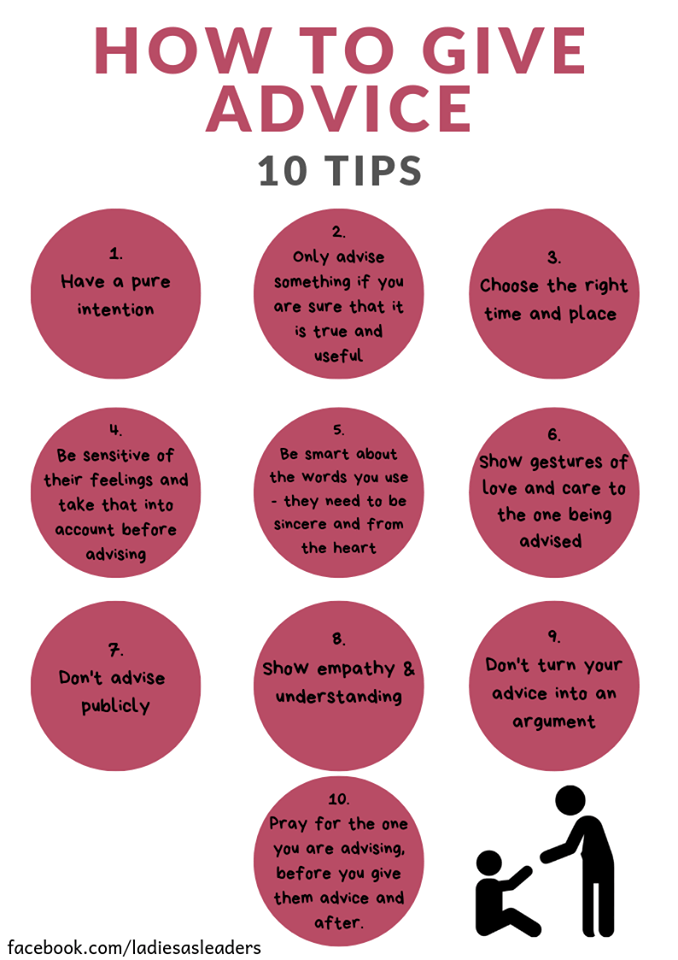Next time you want to offer someone a piece of advice, think about these 10 points:
- Have a pure intention – you should be doing it for the sake of Allah (SWH). This means that you are not doing it to give them a bad reputation, to satisfy your own ego, or to show off in front of others. Be like the prophets who always told their people:
وَأَنَا لَكُمْ نَاصِحٌ أَمِينٌ
I am to you a trustworthy advisor (Qur’an 7:68) - Only advise something if you are sure that it is true and useful.
- Choose the right time and place to give someone advice. Don’t give advice when you or the person are in an emotional/angry state or when there are many people around.
- Be sensitive to their feelings and take that into account before advising.
- Be smart about the words you use – they need to be sincere and from the heart.
- Show gestures of love and care to the one being advised before you give them the advice. This could include putting your hand on their shoulder, using a gentle voice, give them reassurance if they are worried about something and so on.
- Keep the advice only between you two, don’t do it publicly. If there are others there, wait until you’re alone. If you are giving advice on social media, do it through private messaging rather than in comments.
- Show the one you are advising that you are empathetic and understanding of their situation. If they want to clarify something that you may have misunderstood, actually listen.
- Don’t turn your advice into an argument. The purpose is to correct a fault not to engage in futile arguments.
- Pray for the one you are advising before you give them advice and after. This solidifies in your heart and mind that you are giving the advice for the sake of Allah (swt), and your advice is of a genuine – not judgemental nature.
Imam al-Sajjad (as) in his Treatise on Rights (رسالة الحقوق) gives us the perfect guidance for how to treat the one to whom you are giving advice:
وَأمّـا حَقُّ المُسْتَشِيرِ، فَإنْ حَضَرَكَ لَهُ وَجْهُ رَأْىٍ جَهَدْتَ لَهُ فِي النَّصِيحَـةِ، وَأَشَرْتَ عَلَيهِ بمَا تَعْلَمُ أَنَّكَ لَوْ كُنْتَ مَكَانهُ عَمِلْتَ بهِ، وَذَلِكَ لِيَكُنْ مِنْكَ فِي رَحْمَةٍ وَلِينٍ، فَإنَّ اللِّينَ يُؤْنِسُ الْوَحْشَةَ وَإنَّ الْغِلْظَ يُوحِشُ مَوضِعَ الأنْسِ. وَإنْ لَمْ يَحْضُرْكَ لَهُ رَأيٌ وَعَرَفْتَ لَهُ مَنْ تثِقُ برَأيِهِ وَترْضَى بهِ لِنَفْسِكَ دَلَلْتَهُ عَلَيْهِ وَأَرْشَدتَهُ إلَيْهِ، فَكُنْتَ لَمْ تَـألُهُ خَيرًا وَلَمْ تَدَّخِرْهُ نُصْحاً. ولا حَوْلَ ولا قُوَّةَ إلا باللهِ
And the right of him who seeks your advice is that you should exert all efforts to advise him if you can provide him with a good opinion, and suggest to him to choose what you would have chosen if you were in his shoes. You should do so with mercy and with lenience since lenience will eliminate fear while rudeness will eliminate friendliness. But if you do not have any good advice for him, you should refer him to someone else whom you know and trust his advice yourself. You should spare no efforts to guide him towards the good and do your best to advise him. And there is no power but in God.






